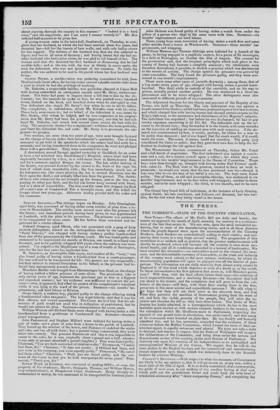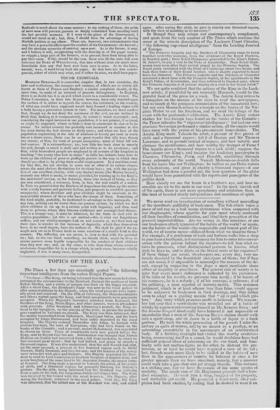THE PRESS.
THE CURRENCY—STATE OF THE COUNTRY CIRCULATION.
NEW TIMES—The effects of Mr. Peel's Bill are daily and hourly, the nearer we approach the month of April, arousing the country to a consciousness of the fate that awaits it. We can state, upon the most undoubted authority, that in most of the manufacturing towns, and in all those districts where the people depend most upon the accommodation of the Country Bankers, these Bankers are systematically calling in their credits, and narrowing their issues to a very large amount weekly. The progression of this restriction is so uniform and so general, that the greatest embarrassment will shortly be produced, which will increase till the country is once more rerdered frantic, and all its confidence absorbed in a torrent of bankruptcy. We have reached this alternative—we must either resort to the vitiated, the insecure, and the discreditable currency of Lancashire, or the trade and industry of the country must submit to the most ruinous restrictions, by which its manufacturing population will again be plunged into all the horrors of pauperism. The information we are daily receiving from almost every county in England is of that kind which deprives its even of a doubt as to the result. In these circumstances the first question that arises is, will Ministers persevere? Will they, with the fatal effects before their eyes—the certainty of fresh impoverishments, and a declining Revenue—the discontent that will cry aloud in the streets, and the complaints that will pour in from the collectors of the taxes—will they, with these facts staring them in the face, persevere in this most unwise and unjustifiable measure ? We still cling to ipe hope that they will see their error at the eleventh hour, and that when they perceive the machine of Government grating from the want of oil, and from the visible poverty of the people, they will relax the restraint and abandon the bill as they have done before. The Duke of Wellington has lately admitted, in a correspondence which he has in the most laudable spirit carried an with certain eminent bankers in the country, that the calculation which Mr. Goulbitrn made to Parliament, respecting the amount of one pound notes in circulation, was under-rated; and that many of his statements were founded on false data. He has frankly and honestly admitted this, and he has, moreover, conceded that the evidence of those witnesses before the Bullion Committee, which formed the basis of their celebrated report, is equally erroneous and absurd. We have not only a right to demand, but reasons to expect, that the Duke of Wellington will re-open the deliberations of the Committee, and bring them under the serious and dispassionate review of the country, in the next Session of Parliament. We sincerely rely upon this exercise of his independence as an unshackled and uncompromised Minister of the Crown. We expect that he will do. the same justice to the English hankers and the Commercial and manufacturing classes dependent upon them, which was reluctantly done to the Scottish bankers by a former Ministry.
COBBETT'S REGISTEn.—With respect to what the measures of Government are likely to he, my opinion is, that it will persevere to, at any rate, within a short time of the fifth of April. It is so firmly committed, that common pride, the pride of mere man, to say nothing of the swollen feeling of that sort, which puffs out the protuberant breast and sends back the lofty head of whiskered aristocracy after " twice conquering France," and conquering the Radicals in much about the same manner ; to say nothing of these, the pride of mere man will prevent person's so deeply committed from recoiling until the last possible moment. If I were in the place of the Government, I would not recoil at all; but, then, I should have the advantage of 'having Norfolk petition at my elbow. There are, however, two circumstances that may have a powerful effect upon the conduct of the Government : the fiercest ; and the absolute necessity of entering upon war. As to the former, it may, and I believe it will, co-operating with the drawing in of the paper money, so cripple a large part of the farmers, as to prevent them from being able to pay their rents. If this should be the case, those who till the seats will soon convince the DUKE of WELLINGTON, that men without arms are much more formidable than any that have ever been seen in arms. As to the latter, namely, wan, it must bring back the paper. So that here are two contingencies, either of which may arise, and if either do arise, we shall have paper.



















 Previous page
Previous page